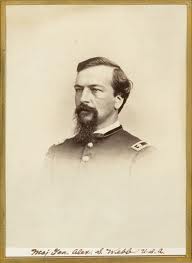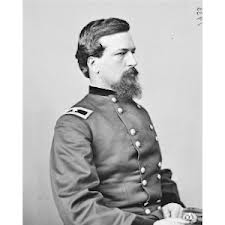 Alexander Webb, was not only one of many Gettysburg’s Heros, but was also a New York Patriot. Some of the volunteers, during the Civil War, exhibited a tremendous loyalty and considered it their honor to serve and protect their country. The United States Military Academy produced several brilliant and outstanding officers, one of which was Alexander S. Webb.
Alexander Webb, was not only one of many Gettysburg’s Heros, but was also a New York Patriot. Some of the volunteers, during the Civil War, exhibited a tremendous loyalty and considered it their honor to serve and protect their country. The United States Military Academy produced several brilliant and outstanding officers, one of which was Alexander S. Webb.
Alexander Stewart Webb, born in 1835, was a native of New York City. He came from a well to do family and a long line of military descendents. Webb attended private preparatory schools, was admitted to the United States Military Academy and graduated in the top third of his class in 1855. The young 2nd Lieutenant’s first post, as an Artillery Officer, was in Florida, where he saw action in the Seminole War. After varied assignments he returned to the Academy, in 1857, as an assistant mathematics professor. He remained as an instructor, until he decided to resign his position and volunteer for combat duty.
In April of 1861, Webb was sent to Fort Pickens, Florida and was promoted First Lieutenant, serving in the 2nd U.S. Artillery. He saw action, as a Captain, at the first Battle of Bull Run, served under General Barry as an aid-de-camp in the defense of Washington, was instrumental in the artillery placement at Malvern Hill, on the Peninsula, was active in the Maryland Campaign, served on staff at Antietam, where he was promoted to Lieutenant Colonel and in 1863, General Meade finally gave Webb battle command at Chancellorsville. His performance and reports of his leadership qualities were forwarded to Lincoln, who promoted Webb to Brigadier General.
Brigadier General Webb, serving under Meade, was given command of the Philadelphia Brigade and deployed with other II Corps, at Gettysburg, on Cemetery Ridge, July 2, 1863. Webb’s detachment repulsed an attack of a Georgian brigade and followed up, capturing over 300 and counter attacked Early’s troops on Cemetery Hill.
 On July 3, 1863, Webb’s Philadelphians manned the center of the line, behind a low stone wall. Confederate General Lee had instructed General Pickett’s men to assault Cemetery Ridge and proceeded the advance with the greatest artillery barrage of the Civil War. Thousands of Pickett’s troops advanced over one mile, broken and bloodied by counter-battery canister and grape, to pierce Webb’s center. As the Confederates approached the wall, Webb stood in front of his line, cool and calm, attempting to inspire his men. Two Union companies panicked and ran, Webb hailed a steadfast supporting command and they wouldn’t advance to fill the breach. As the Rebels climbed the wall, Alexander Webb prepared to defend his position all alone. At the last second, two New York Regiments, fired down the line, enfilading the attacking Confederate’s, these New Yorker’s charged and in a bloody hand to hand engagement, drove the enemy back across the field. Webb had fallen, shot through the groin, but still attempted to fight on and rally his men. Lincoln nominated Webb for his gallantry and the Senate confirmed his promotion to brevet Brigadier General on February 14, 1865.
On July 3, 1863, Webb’s Philadelphians manned the center of the line, behind a low stone wall. Confederate General Lee had instructed General Pickett’s men to assault Cemetery Ridge and proceeded the advance with the greatest artillery barrage of the Civil War. Thousands of Pickett’s troops advanced over one mile, broken and bloodied by counter-battery canister and grape, to pierce Webb’s center. As the Confederates approached the wall, Webb stood in front of his line, cool and calm, attempting to inspire his men. Two Union companies panicked and ran, Webb hailed a steadfast supporting command and they wouldn’t advance to fill the breach. As the Rebels climbed the wall, Alexander Webb prepared to defend his position all alone. At the last second, two New York Regiments, fired down the line, enfilading the attacking Confederate’s, these New Yorker’s charged and in a bloody hand to hand engagement, drove the enemy back across the field. Webb had fallen, shot through the groin, but still attempted to fight on and rally his men. Lincoln nominated Webb for his gallantry and the Senate confirmed his promotion to brevet Brigadier General on February 14, 1865.
General Webb returned to command after Gettysburg and saw additional action at Bristoe Station, the Overland Campaign and was again severely wounded, perceived as fatal, at the Battle of Spotsylvania. He returned to service in January of 1865, as Chief of Staff of the Army of the Potomac, till the end of the Civil War.
For his brave and gallant leadership, Webb was awarded the Congressional Medal of Honor on September 28, 1891, the citation read, “Rank and organization: Brigadier General, U.S. Volunteers. Place and date: At Gettysburg, Pa., 3 July 1863. Entered service at: New York, N.Y. Born: 15 February 1835, New York, N.Y. Date of issue: 28 September 1891. Citation: Distinguished personal gallantry in leading his men forward at a critical period in the contest.”
Alexander S. Webb was not only a Gettysburg Hero, but an inspiration to all who served with this New York Patriot.
Bummer


Thanks for filling me in on a name I had heard but otherwise known little about before. With some of these lesser-known figures like Webb or Pennypacker, I humbly would like to ask if you could tell us a little more about their lives and careers after the war. Maybe that way you can get more blog posts out of these fascinating figures.
Louis,
Bummer normally concludes with the end of the individual Civil War careers. Some have had fascinating Post War adventures. Great idea! Will commence soon.
“Old Guy”